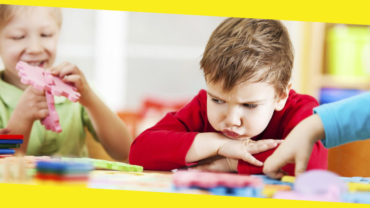Words That Parents Should Never Say to Their Teenage Children
This post was last updated on March 2nd, 2024

The significance of teenagers’ emotions lies in their pivotal role in the developmental journey from adolescence to adulthood. Adolescence is a period marked by rapid physical, cognitive, and emotional changes, and understanding and navigating these emotions is crucial for healthy maturation. Teenagers’ emotions serve as a barometer for their mental well-being, reflecting the challenges and triumphs they experience during this transformative phase. Emotional intelligence, developed during these years, plays a vital role in shaping interpersonal relationships, decision-making, and overall resilience.
Furthermore, the recognition and validation of teenagers’ emotions foster a supportive environment. By acknowledging their feelings, adults and peers contribute to a sense of identity and self-worth, promoting positive mental health outcomes. It also aids in the development of coping mechanisms, allowing teenagers to manage stress, anxiety, and other emotional challenges effectively. In the broader societal context, understanding and respecting teenagers’ emotions is essential for fostering a compassionate and empathetic community. Here the role of parents in the life of their teenage kids becomes crucial and according to research parents’ speech makes a significant impact on teens’ mind. There are some words that parents should never say to their teenagers. It lays the foundation for open communication and helps bridge generational gaps. Ultimately, recognizing the significance of teenagers’ emotions is integral to promoting their well-being and ensuring a smoother transition into responsible and emotionally intelligent adulthood.
Contents
ToggleTeenagers and their Mental Wellbeing
Teenagers and their mental well-being are interconnected in a complex and crucial way. Adolescence is a period of intense psychological development, where individuals grapple with identity formation, peer pressure, academic stress, and hormonal changes. Here are several key aspects related to teens and mental well-being:
- Identity Formation: Adolescence is a time of self-discovery and identity formation. Teens often grapple with questions of self-worth, acceptance, and understanding their place in the world. A positive self-image contributes significantly to mental well-being.
- Peer Relationships: Social connections become paramount during adolescence. Friendships and peer relationships can significantly impact mental health. Positive relationships provide support, while negative experiences such as bullying or social exclusion can lead to stress and anxiety.
- Academic Pressures: Academic expectations, including exams and college preparations, can contribute to stress. Striking a balance between academic achievement and well-being is crucial for mental health during this time.
- Hormonal Changes: Biological changes, including hormonal fluctuations, play a role in mood swings and emotional sensitivity during adolescence. Understanding these changes helps both teens and their caregivers navigate this period.
- Technology and Social Media: The pervasive use of technology and social media can both positively and negatively impact mental health. While it facilitates communication, it also exposes teens to cyberbullying, unrealistic body standards, and a constant comparative mindset.
- Mental Health Stigma: Unfortunately, there is still a stigma around mental health, and teens may be hesitant to seek help due to fear of judgment. It’s essential to promote open conversations and normalize discussions around mental well-being.
- Family Dynamics: Family support is a crucial factor in teen mental health. A supportive family environment, with open communication and understanding, contributes positively to a teenager’s emotional well-being.
Promoting positive mental health in teenagers involves a comprehensive approach that includes education, destigmatization, and accessible mental health resources. Encouraging open communication, providing a supportive environment, and fostering resilience are essential components in nurturing the mental well-being of teenagers.
Role of Parents in Teenagers’ Life
Parents play crucial roles in the lives of teenagers, contributing significantly to their emotional, social, and cognitive development. Here are key roles that parents undertake during their children’s teenage years:
- Support and Guidance: Adolescence is a time of exploration and self-discovery. Parents provide emotional support and guidance as teenagers navigate identity formation, peer relationships, and life choices.
- Setting Boundaries: Establishing clear and reasonable boundaries is important for teenagers. It helps them understand expectations, fosters a sense of security, and teaches responsibility.
- Communication: Open and honest communication is essential. Parents should create a safe space for teenagers to express thoughts and feelings, fostering trust and understanding. All parents must know certain words they should never say to their teenagers.
- Role Modelling: Parents serve as role models for behavior and values. Teenagers often observe and emulate their parents’ attitudes and actions, making positive parental role modelling crucial.
- Education on Decision-Making: Adolescents are learning to make independent decisions. Parents can guide them in developing critical thinking skills, considering consequences, and making informed choices.
- Emotional Regulation: Teenagers experience a rollercoaster of emotions. Parents help them understand and manage these feelings, teaching coping mechanisms and resilience in the face of challenges.
- Encouragement and Positive Reinforcement: Acknowledging achievements and efforts fosters a positive self-image. Parents should provide constructive feedback and encouragement, boosting their teenager’s confidence.
- Financial Literacy: Teaching teenagers about budgeting, saving, and responsible financial behaviour is crucial as they approach adulthood. This prepares them for financial independence.
- Monitoring and Supervision: While allowing independence, parents must maintain a level of supervision, ensuring their teenager’s safety and well-being.
- Respect for Individuality: Recognizing and respecting the uniqueness of each teenager is important. Parents should encourage their interests, passions, and individual strengths.
- Health and Well-Being: Promoting healthy habits, both physical and mental, is vital. This includes proper nutrition, exercise, adequate sleep, and addressing any mental health concerns.
- Preparation for Adulthood: Parents play a role in preparing their teenagers for the responsibilities of adulthood. This includes practical skills such as cooking, laundry, and basic life skills, as well as discussions about career paths and future goals.
- Crisis Management: Being available during challenging times is crucial. Whether facing academic stress, relationship issues, or other difficulties, parents serve as a source of comfort and assistance.
- Cultural and Moral Values: Instilling a sense of cultural identity and moral values helps teenagers develop a strong ethical foundation, guiding their behaviour in various life situations.
Hence, balancing support and autonomy, parents contribute significantly to the well-rounded development of their teenagers, preparing them for the challenges and opportunities that come with adulthood.
Words Parents Should Never Say to Their Teen Children
While communication is essential in parent-teen relationships, certain words and phrases can be detrimental and may hinder healthy interaction. Here are some words and expressions that parents should never say to their teenagers:
- “You always/never…” – Using absolutes can make teens feel misunderstood and defensive. It’s important to address specific behaviors rather than making sweeping generalizations.
- “Because I said so” or “Because I’m the parent” – While authority is important, dismissing a teenager’s questions or concerns with these phrases may lead to frustration and hinder the development of critical thinking.
- “You’re just like…” – Comparisons to siblings, peers, or even the parent themselves can create feelings of inadequacy and resentment.
- “You’re being too sensitive” or “You’re overreacting” – Dismissing a teenager’s emotions can make them feel invalidated. It’s important to acknowledge and respect their feelings, even if you don’t fully understand them.
- “This is easy; I don’t know why you’re struggling” – Minimizing a teenager’s challenges can create pressure and undermine their confidence. Acknowledge their efforts and offer support.
- “You should be more like…” – Pressuring a teenager to conform to someone else’s standards can damage their self-esteem. Encourage individuality and celebrate their unique qualities.
- “I’m disappointed in you” – While expressing disappointment is natural, framing it in a way that suggests a fundamental flaw can be damaging. Focus on specific behaviours and offer guidance for improvement.
- “You’re not trying hard enough” – Teens often face various pressures, and this statement may make them feel inadequate. Instead, offer support and encouragement to help them navigate challenges.
- “When I was your age…” – While sharing personal experiences can be valuable, using this phrase dismissively may make teens feel unheard or belittled.
- “You’re just a teenager; you don’t understand” – Dismissing a teen’s perspective based on their age can create distance that are considered as the critical words that parents should never say to their teenagers. Instead, engage in open conversations to understand their viewpoint.
Effective communication involves empathy, active listening, and respect, therefore, avoiding these potentially harmful phrases can contribute to a more positive and constructive parent-teen relationship.
Recommended For You
Top 10 Effective Strategies To Manage Kids/Toddlers Tantrums
Priyadarshini Muduli
A full time passionate writer with imperishable determination to bring healthy, smart and pragmatic changes individually and socially. Concentrate especially on lifestyle, life and personal improvement, relationships, mental health and behavior, viral issues and literature based subjects.




